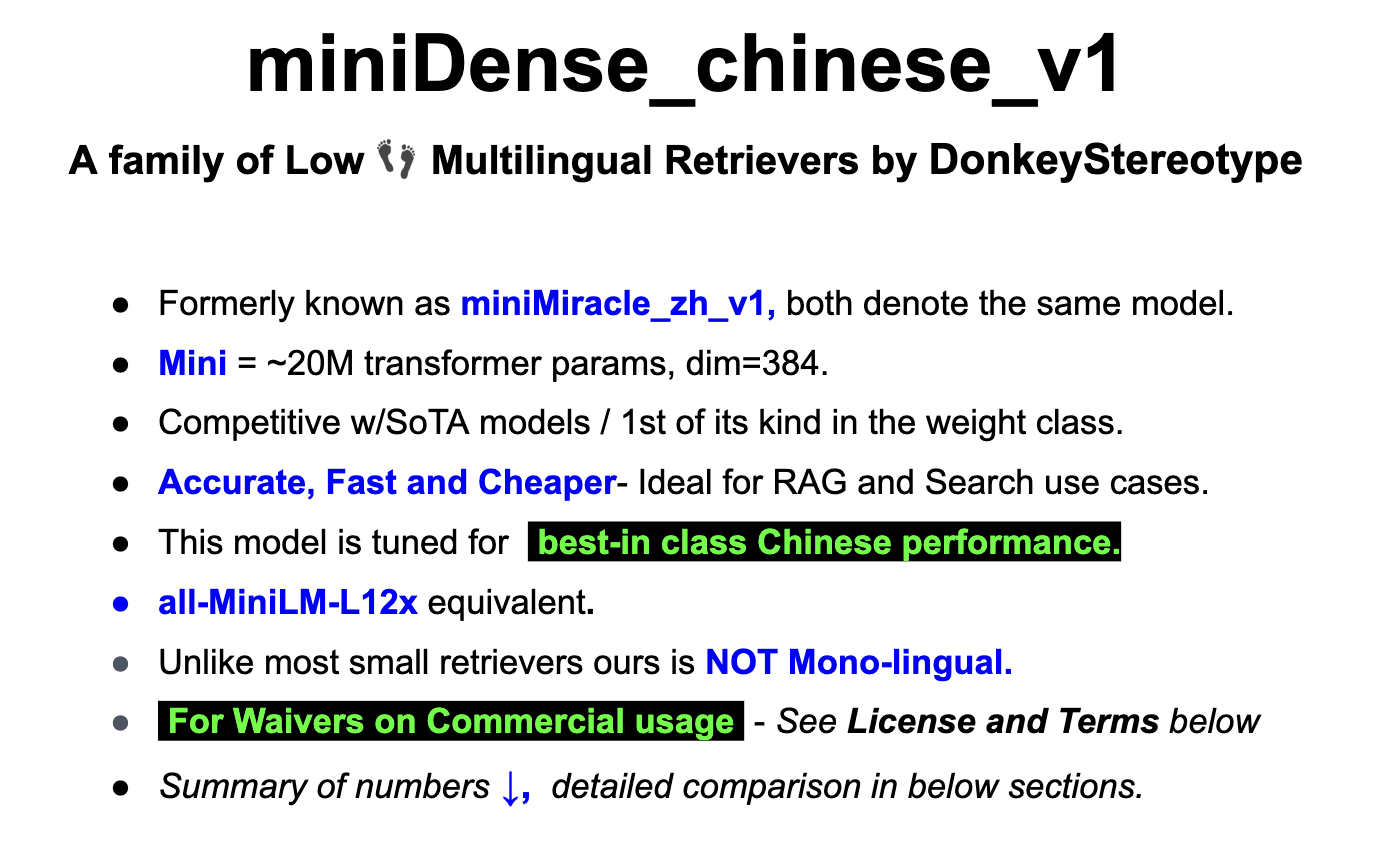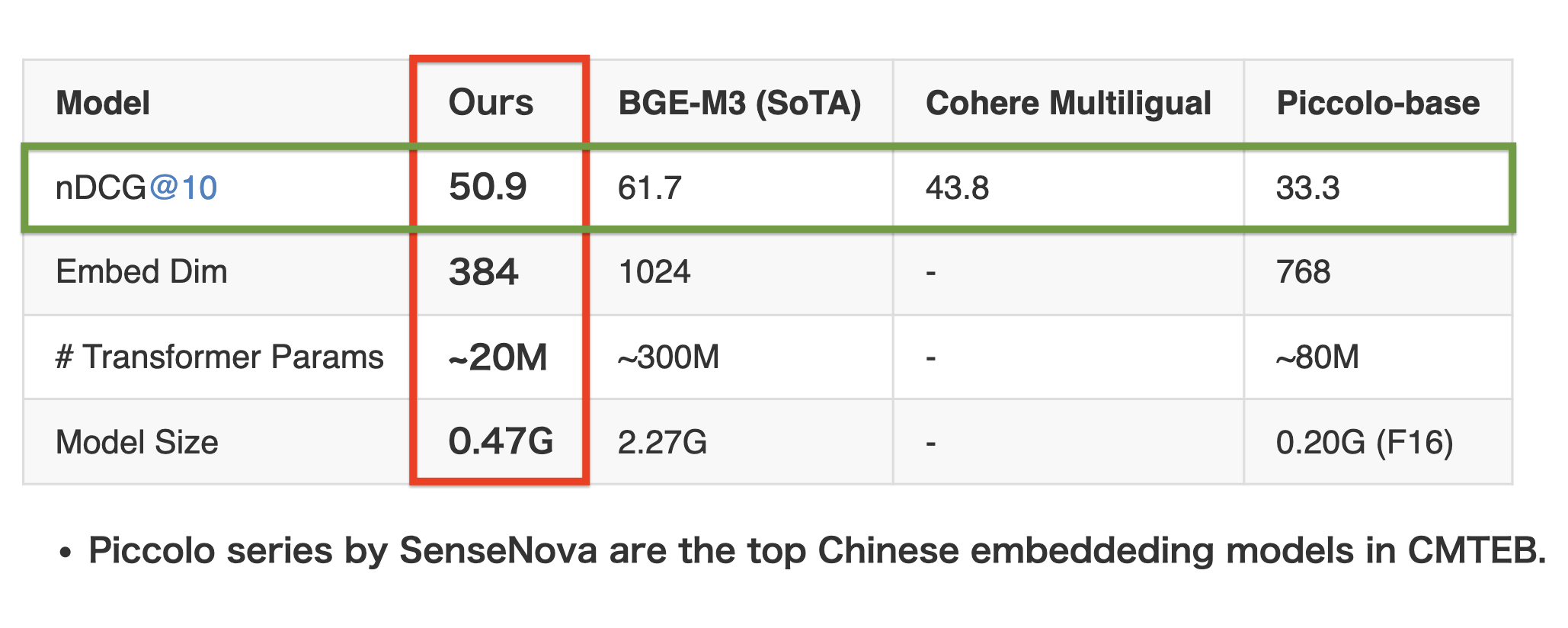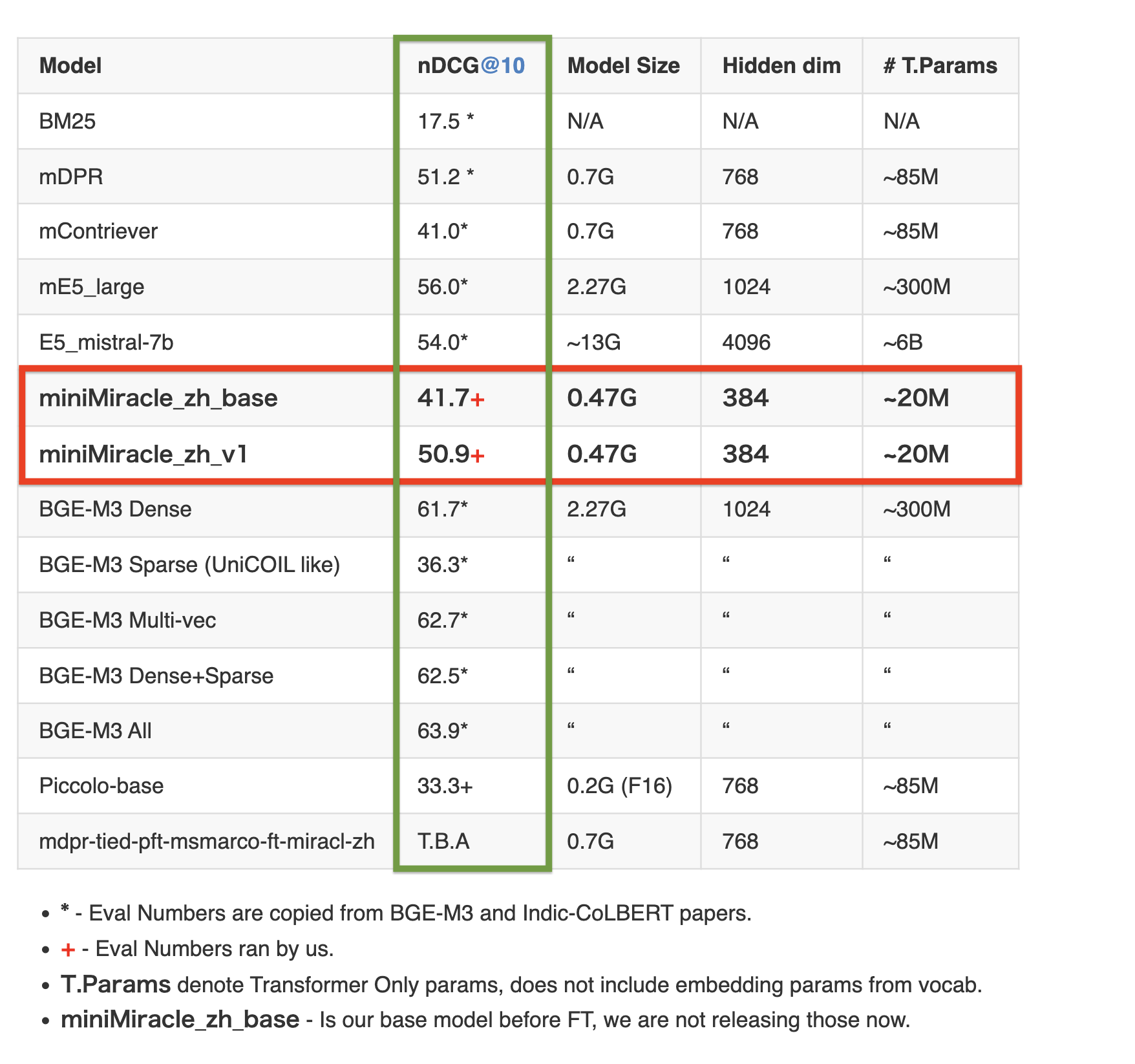license: cc-by-nc-nd-4.0
language:
- zh
datasets:
- MIRACL
tags:
- miniMiracle
- passage-retrieval
- knowledge-distillation
- middle-training
pretty_name: >-
miniMiracle is a family of High-quality, Light Weight and Easy deploy
multilingual embedders / retrievers, primarily focussed on Indo-Aryan and
Indo-Dravidin Languages.
library_name: transformers
pipeline_tag: sentence-similarity



Table 1: Chinese retrieval performance on the MIRACL dev set (measured by nDCG@10)
Architecture:
- Model: BERT.
- Tokenizer: XLM-Roberta's Tokenizer.
Table Of Contents
- License and Terms:
- Detailed comparison & Our Contribution:
- ONNX & GGUF Variants:
- Usage:
- FAQs
- Roadmap
- Notes on Reproducing:
- Reference:
- Note on model bias
License and Terms:

Detailed comparison & Our Contribution:
English language famously have all-minilm series models which were great for quick experimentations and for certain production workloads. The Idea is to have same for the other popular langauges, starting with Indo-Aryan and Indo-Dravidian languages. Our innovation is in bringing high quality models which easy to serve and embeddings are cheaper to store without ANY pretraining or expensive finetuning. For instance, all-minilm are finetuned on 1-Billion pairs. We offer a very lean model but with a huge vocabulary - around 250K. We will add more details here.

Table 2: Detailed Chinese retrieval performance on the MIRACL dev set (measured by nDCG@10)
Full set of evaluation numbers for our model
{'NDCG@1': 0.43511, 'NDCG@3': 0.42434, 'NDCG@5': 0.45298, 'NDCG@10': 0.50914, 'NDCG@100': 0.5815, 'NDCG@1000': 0.59392}
{'MAP@1': 0.21342, 'MAP@3': 0.32967, 'MAP@5': 0.36798, 'MAP@10': 0.39908, 'MAP@100': 0.42592, 'MAP@1000': 0.42686}
{'Recall@10': 0.63258, 'Recall@50': 0.85, 'Recall@100': 0.91595, 'Recall@200': 0.942, 'Recall@500': 0.96924, 'Recall@1000': 0.9857}
{'P@1': 0.43511, 'P@3': 0.29177, 'P@5': 0.22545, 'P@10': 0.14758, 'P@100': 0.02252, 'P@1000': 0.00249}
{'MRR@10': 0.55448, 'MRR@100': 0.56288, 'MRR@1000': 0.56294}
Usage:
With Sentence Transformers:
from sentence_transformers import SentenceTransformer
import scipy.spatial
model = SentenceTransformer('prithivida/miniMiracle_zh_v1')
corpus = [
'一个男人正在吃东西',
'人们正在吃一块面包',
'女孩抱着婴儿',
'一个男人正在骑马',
'一个女人正在弹吉他',
'两个人推着马车穿过树林',
'一个人骑着一匹白马在一个封闭的田野里',
'一只猴子在打鼓',
'一只猎豹正在猎物后面奔跑',
'他们享受了一顿美味的盛宴'
]
queries = [
'一个人在吃意大利面',
'一个穿着大猩猩服装的人在打鼓'
]
corpus_embeddings = model.encode(corpus)
query_embeddings = model.encode(queries)
# Find the closest 3 sentences of the corpus for each query sentence based on cosine similarity
closest_n = 3
for query, query_embedding in zip(queries, query_embeddings):
distances = scipy.spatial.distance.cdist([query_embedding], corpus_embeddings, "cosine")[0]
results = zip(range(len(distances)), distances)
results = sorted(results, key=lambda x: x[1])
print("\n======================\n")
print("Query:", query)
print("\nTop 3 most similar sentences in corpus:\n")
for idx, distance in results[0:closest_n]:
print(corpus[idx].strip(), "(Score: %.4f)" % (1-distance))
# Optional: How to quantize the embeddings
# binary_embeddings = quantize_embeddings(embeddings, precision="ubinary")
With Huggingface Transformers:
- T.B.A
FAQs:
How can I reduce overall inference cost ?
- You can host these models without heavy torch dependency using the ONNX flavours of these models via FlashRetrieve library.
How do I reduce vector storage cost ?
Use Binary and Scalar Quantisation
How do I offer hybrid search to improve accuracy ?
MIRACL paper shows simply combining BM25 is a good starting point for a Hybrid option: The below numbers are with mDPR model, but miniMiracle_zh_v1 should give a even better hybrid performance.
| Language | ISO | nDCG@10 BM25 | nDCG@10 mDPR | nDCG@10 Hybrid |
|---|---|---|---|---|
| Chinese | zh | 0.175 | 0.512 | 0.526 |
Note: MIRACL paper shows a different (higher) value for BM25 Chinese, So we are taking that value from BGE-M3 paper, rest all are form the MIRACL paper.
Why not run cMTEB?
CMTEB is a general purpose embedding evaluation bechmark covering wide range of tasks, but like BGE-M3, miniMiracle models are predominantly tuned for retireval tasks aimed at search & IR based usecases. But we would run the retrieval slice of the cMTEB and add the scores here.
Roadmap
We will add miniMiracle series of models for all popular languages as we see fit or based on community requests in phases. Some of the languages we have in our list are
- Spanish
- Tamil
- Arabic
- German
- English ?
Notes on reproducing:
We welcome anyone to reproduce our results. Here are some tips and observations:
- Use CLS Pooling and Inner Product.
- There may be minor differences in the numbers when reproducing, for instance BGE-M3 reports a nDCG@10 of 59.3 for MIRACL hindi and we Observed only 58.9.
Here are our numbers for the full hindi run on BGE-M3
{'NDCG@1': 0.49714, 'NDCG@3': 0.5115, 'NDCG@5': 0.53908, 'NDCG@10': 0.58936, 'NDCG@100': 0.6457, 'NDCG@1000': 0.65336}
{'MAP@1': 0.28845, 'MAP@3': 0.42424, 'MAP@5': 0.46455, 'MAP@10': 0.49955, 'MAP@100': 0.51886, 'MAP@1000': 0.51933}
{'Recall@10': 0.73032, 'Recall@50': 0.8987, 'Recall@100': 0.93974, 'Recall@200': 0.95763, 'Recall@500': 0.97813, 'Recall@1000': 0.9902}
{'P@1': 0.49714, 'P@3': 0.33048, 'P@5': 0.24629, 'P@10': 0.15543, 'P@100': 0.0202, 'P@1000': 0.00212}
{'MRR@10': 0.60893, 'MRR@100': 0.615, 'MRR@1000': 0.6151}
Fair warning BGE-M3 is $ expensive to evaluate, probably that's why it's not part of any of the retrieval slice of MTEB benchmarks.
Reference:
- All Cohere numbers are copied form here
- BGE M3-Embedding: Multi-Lingual, Multi-Functionality, Multi-Granularity Text Embeddings Through Self-Knowledge Distillation
- Making a MIRACL: Multilingual Information Retrieval Across a Continuum of Languages
- IndicIRSuite: Multilingual Dataset and Neural Information Models for Indian Languages
Note on model bias:
- Like any model this model might carry inherent biases from the base models and the datasets it was pretrained and finetuned on. Please use responsibly.